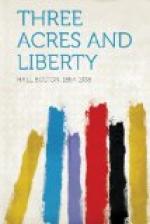The foregoing shows that in every section opportunities of getting the people to the land exist. Where a man should go is determined by a variety of things. If he be a newly arrived immigrant used to land work in Southern Europe, he would find his best chance in the South; if a German or Russian, or from any of the Northern European countries, he would find the beet-sugar sections of Michigan Colorado, or California more to his liking; if American born, without much knowledge of out-door work, and feeling the need of social life, the cheap farms of New York, New Jersey, and New England would probably be most attractive.
Many persons write me that I say it is necessary to get good land near population or with cheap and assured transportation facilities—and that it must not cost more than it is worth for gardening. “I find,” they say, “that such acres are held as ‘lots’ at wildly speculative prices” and they ask “Where can I find such land?” But this is a book on agricultural use of land. Why land costs too much and where the remedy lies are other questions, dealt with in my “Things as They Are.”
However, probably the best chances now for intensive cultivation are in New Jersey, in the backwoods of the Middle states now made accessible by cheap autos—and in the South.
What can be undertaken with good prospects of success will be outlined in the following chapters.
CHAPTER III
HOW TO BUY THE FARM
Before the purchase of the land for a home in the country, some consideration ought to be given to probable increase in land values. Even if you are primarily interested in your early sales of produce, you will not object to reaping an additional profit from the presence of other people.
Inasmuch as density of population determines land values, it follows that vacant land near a large city at $100 per acre may be cheaper than similar land at a distance would be at $10 per acre. If you buy real estate, you become a silent partner who does nothing, but takes most of the profits of the business of others.
Some persons see so clearly that money is often easily gotten by investing in land, that sometimes they make mistakes, in trying to get in. It is as easy to be a lamb in the real estate market as it is in the stock market.
Foresight, judgment, and experience or luck are essential to success in real estate dealing, but help, at least in keeping out of danger, may be had by following a few simple rules, if one can command a little capital, borrowed or owned.
The following points, suggested by a professional land shark, will certainly be of interest and possibly of profit to the intending buyer. I believe myself that they contain the whole philosophy of land speculation.
For a sure profit buy low-priced land, keeping as near the “raw material” as possible; high-priced property is risky and expensive to carry. An acre which costs one or two hundred dollars, or ten dollars per lot, will cost but six to twelve dollars per year to carry and half a dollar for taxes, and if a stable does come next you, why, you can sell your land for a blacksmith shop.




